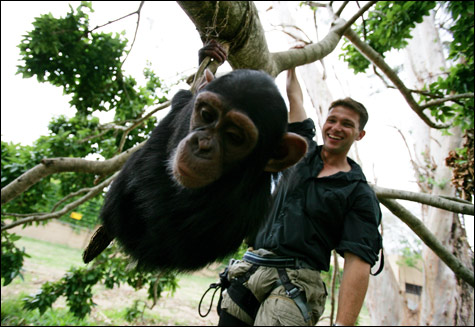
PRIMATE POLITICS: Cussons rehabs mistreated chimps by placing himself in the hierarchy.
|
The truth is the truth, and we hacks must face up to it: it is no longer amusing to come up with ideas for hypothetical reality shows. It may even be dangerous. They’ll all get made, sooner or later, and chattering about them in advance serves only to inflate the ballooning, light-blocking potentiality of the reality sphere. So let me soberly predict, then, the one-of-these-days arrival of a show called Tough Nuts, in which Bear Grylls of Man vs. Wild and Les Stroud of Survivorman are joined by Eugene Cussons of Escape to Chimp Eden for some kind of pan-disciplinary contest in wilderness living. Dump these hard men in a desert, or some fuming patch of jungle, and see who lasts longest. Cussons will be the dark horse here. The excitable Grylls has all of his tricks, of course, his urine-soaked T-shirts knotted around the head and so on, and Stroud will be dourly cognizant of the various environmental necessities. But Cussons — he may not be as much of a forager or a fire starter as those guys, but he can talk to the animals.
Escape to Chimp Eden, which wrapped up its first season this past Friday on Animal Planet, was a showcase for Cussons’s Dr. Dolittle skills. His mission in life is most honorable: he rescues captive chimpanzees from abusive situations, takes them back to his Chimp Eden sanctuary in Mpumalanga, South Africa, and rehabilitates them. Is it inhuman to treat an ape badly? It appears to be very human indeed. Zac was kept on a chain for 17 years outside a factory: the workers gave him beer and smokes. Xena’s owners held her down and shaved her. Sampa was imprisoned in a floorless cage, sleeping across the bars, tormented through the daylight hours by a pack of malevolent children. The eyes of these chimps, reddish-black in caverns of wrinkled flesh, hold an extraordinary mixture of rage and pathos. Cussons is their redeemer: once he has them back at Chimp Eden he coaxes, protects, and disciplines the traumatized animals until they have no need of him anymore. “If chimps do not have respect for you on the ground,” he says, “they might have it in the trees.” And up he goes, swinging from limb to limb, making soothing little grunts and huffing sounds. The apes drape their arms gratefully over his khaki-shirted shoulders.
Much of his insight is political — by analyzing the various alliances and rivalries within a given group, Cussons determines where to position himself within the hierarchy. The entire final episode, for example, was taken up with a week-long siege upon the patience of Jao, grumpy alpha male of the infants’ enclosure. Would Jao allow Cussons in to do his work? Jao seemed amenable, extending his black banana-fingered hand, but then he tried to pull Cussons to the ground, possibly for an extended session of chimp aggro. “Mixed signals,” frowned Cussons. On a cloudy day, sun-loving Jao was particularly out of sorts, scratching at his armpits in a manner that betokened, according to Cussons, “huge irritation.” The moment came when contact could be deferred no longer, and Cussons, nervous perhaps, suddenly began talking like somebody from The Apprentice: “I think this is crunch time now. I’m gonna have to suck it up!” Fifteen seconds later, Jao sent him scrambling through a tiny metal hatch in the enclosure wall.